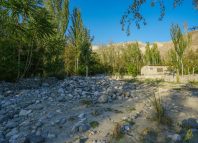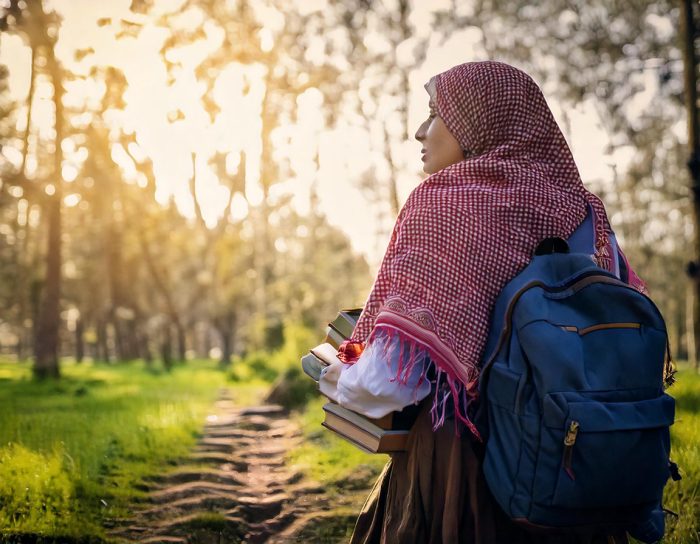Breaking Barriers: Nazia Paving Her Path to Success Amid Education Ban
Since the De Facto Authorities (DFA) takeover in 2021, Afghanistan remains the only country in the world where secondary and higher education for women is strictly banned. Over the past three years, this policy has stripped 1.4 million Afghan girls of their fundamental right to education.[1]
One of the girls affected is Nazia*, a 20-year-old from Kabul province. She lives in a household of nine, including her parents, three sisters, and three brothers, whose aged between nine and 25 years. Despite not receiving formal education, her parents have always prioritised education for their children. Her two elder sisters, aged 23 and 25, were pursuing law degrees—one pursuing a master’s degree, the other a bachelor’s —until their studies were abruptly halted in December 2022 due to the DFA’s policies.[2]
In 2021, Nazia was in the eighth grade in 2021, while her younger sister, Sabira*, was in the seventh. Both girls have been barred from attending school while their brothers, currently in Grades 3, 6, and 11, continue their education. Their mother, a housewife, cares for the family and manages the home, and their father, Nabi*, works as a construction labourer. He earns between AFN 400 and 600 (approximately 6-9 USD) daily, depending on seasonal demand. Despite his limited income, Nabi has always strived to provide educational opportunities for his children.
In March 2021, Nazia excitedly returned to school following the COVID-19 pandemic lockdowns of 2020. Though there were reports of conflict, she never anticipated that her education would be permanently interrupted. When the announcement was made in September 2021, she thought it would be a temporary restriction, owing to the pandemic measures. Yet, three years have now passed since she last attended school, and the continuous rollout of restrictive policies targeting women and girls has left her dreams of becoming an engineer feeling more distant than ever.
Nazia’s daily life has been filled with grief and stress, exacerbated by the uncertainty of whether she and her sisters will ever have the opportunity to pursue their professional aspirations. At home, she helps her mother with household chores and studies independently, trying desperately to cling to her education. The ongoing restrictions have left her deeply disheartened, doubting if she and her sisters will ever have the chance to pursue their professional aspirations.
“Each new academic year brings a renewed sadness,” Nazia*expressed, “Watching my brothers leave for school every morning, just as I once did, only makes me realise how unfair it is. They get to go simply because they are boys, while I’m left behind, feeling completely helpless.”
Nazia was aware of online education initiatives for Afghan girls, but struggled to find available classes, only hearing about them through word of mouth. Though she had no experience with virtual learning, the idea offered a glimmer of hope. Keeping in touch with friends and former classmates, she searched persistently for an accessible programme.
In early 2024, a relative informed her about an online education programme. Encouraged by her uncle, Nazia applied, and helped her sister Sabira as well. Following an anxious wait, they were asked to submit documents and provide a local address for the delivery of educational materials, including tablets, books, and notebooks. By January 2024, Nazia resumed her studies in an online Grade 8 class, while Sabira joined a Grade 7 programme. This was made possible by support from Community World Service Asia (CWSA) and Act for Peace (AFP). CWSA’s project provided Nazia and 64 other girls—22 in Grade 7 and 21 in Grade 8 and 22 in a separate English class[3]—with resources to continue their education online. The Grade 7 and 8 classes include the standard school curriculum, while the English class focused solely on enhancing the enrolled students’ English proficiency. Each student received essential materials and a monthly internet allowance of AFN 1,700 to 1,900 (approx. USD 25- 30) to support their studies, with project teams being accessible to address any challenges that the students may encounter.
The programme is based on the Afghan curriculum and is run in a secure and carefully monitored virtual environment. CWSA signed a Memorandum of Understanding (MoU) with a Pakistan-based school, employing Afghan migrant teachers familiar with the curriculum and students’ language needs. Upon completion, students receive a certificate from the school. Until the end of 2023, CWSA had focused on delivering girls’ education through community-based schools in remote areas, ensuring quality education for teacher training in provinces like Nangarhar, Laghman, and Bamyan. However, after a law banning international NGOs from implementing educational projects[4] was enforced, CWSA adapted to provide online secondary education for girls otherwise excluded from formal schooling.
The project initially targeted girls in Grades 7 and 8 who had been unable to progress beyond Grade 7 due to the ban, requiring proof of prior education for enrollment.
Due to the same security reasons, announcements for these classes are not made publicly. Instead, information is shared discreetly among students and teachers with prior connections to Community World Service Asia’s (CWSA) education projects.
Though she initially found virtual learning unfamiliar and challenging, Nazia adapted quickly. After receiving guidance on using Google Classroom and Zoom, she now engages in her studies and interacts with her peers enthusiastically. “I remember my first day in class,” Nazia recalled. “Everything was unfamiliar, and I was nervous since I didn’t know anyone. But as we introduced ourselves, my nerves eased. Many girls shared similar stories and were eager to continue learning.”
Now, Nazia enjoys a supportive group of classmates and teachers from diverse regions, engaging in a collaborative and productive learning environment. The students discuss academic subjects, exchange experiences, share ideas, and help one another with assignments. Despite challenges like frequent power outages and an unstable internet connection, Nazia has remained focused. She established a disciplined routine, attending online classes from 8:00 AM to 11:30 AM from Monday to Friday, and helping her family in the afternoon. This dedication has earned her recognition and praise from her teachers. Her hard work has not gone unnoticed—Nazia recently earned top marks in her class and was awarded the Best Student Award, a recognition that boosted her confidence and inspired her peers. Her sister, Sabira, also got the top position in her class.
The second phase of the same project supports students who have graduated from Grade 8 and follow the same online modality. Nazia is one of the students covered under this second phase. She was promoted to Grade 9 in September 2024 and she aspires to become a construction engineer to contribute to her country’s development. “I hope one day schools and universities reopen for us. If not, I will pursue education abroad and return to help build a better future for Afghanistan,” she said. Nazia’s story echoes the dreams of countless Afghan girls, who, despite immense obstacles, hold onto hope for an education. For many, online programmes and the possibility of studying abroad represent their only paths forward, though these opportunities remain out of reach for most due to financial constraints and limited options.
[1] https://www.unesco.org/en/articles/afghanistan-14-million-girls-still-banned-school-de-facto-authorities
[2] https://www.theguardian.com/world/2022/dec/20/taliban-ban-afghan-women-university-education
[3] This is a separate class for students who are interested in improving their English and focuses on written and spoken English.
[4] https://feminist.org/news/taliban-orders-international-organizations-to-stop-all-education-programs-in-afghanistan/







